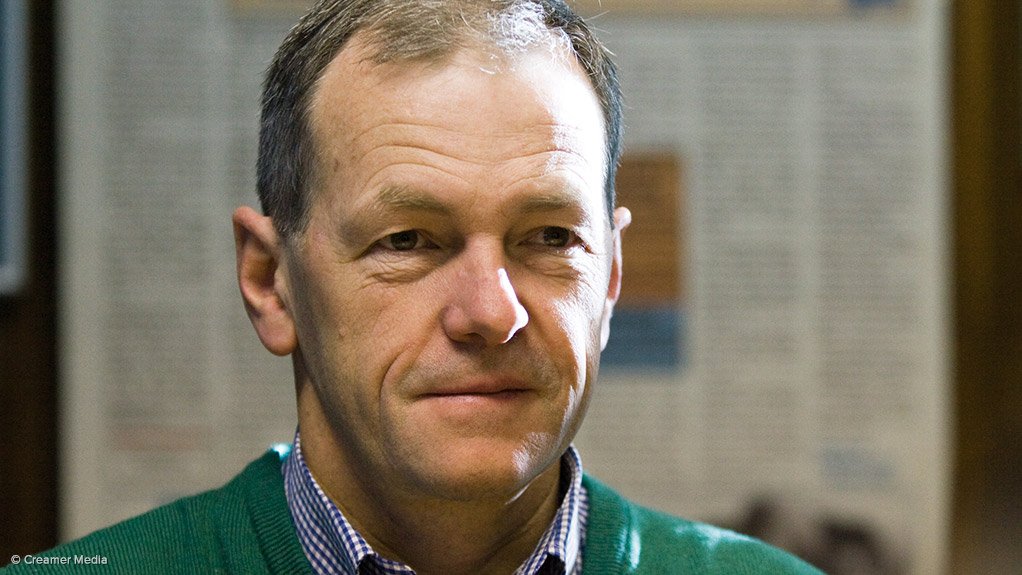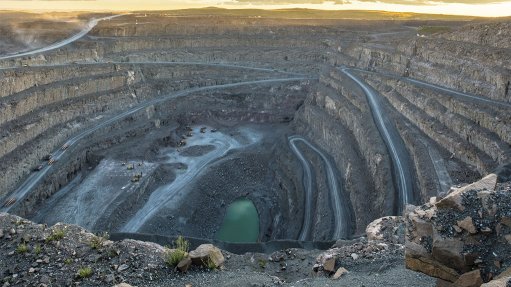Rebranding Teba says its mission now is ‘more about human potential wherever we find it’


GRAHAM HERBERT In the past, we saw our mission as serving mines and mineworkers; now, it is more about unlocking human potential wherever we find it
Photo by Duane Daws
The long-standing Teba Limited business, which recruits and manages local and foreign workers for the mining industry, has changed its approach from being an inward-looking company to one that provides various services to mines, mineworkers and their families.
At a recent media briefing in Johannesburg, Teba executive chairperson Dr James Motlatsi and MD Graham Herbert explained the rationale for the change, which means more than a new brand and position in the marketplace.
“Teba recognises itself as an established stake-holder in the mining industry and will, therefore, become bolder publicly in terms of its thought leadership and opinions, enabling it to tell its stories, as simple as they may be, and have the impact [of its service offering] recognised,” says Herbert.
Teba’s services – in the main – while critical, have hardly been attention grabbing in the past, he acknowledges.
For example, Teba plans to share with the media stories, such as how mineworkers’ widows, who have struggled with poverty for decades, unable to access benefits owing to them, have finally been helped by Teba to complete the necessary paperwork and receive their dues.
Herbert highlights two events in particular – the Marikana massacre and the five-month strike in the platinum sector – that have brought sharply into focus the plight of communities of people associated with the mining industry, directly and indirectly, their frustration and the need for workable solutions and meaningful change.
The challenges experienced by the mineworkers range from financial – for example, making sure money flows smoothly from mineworkers to their families living in rural areas throughout Southern Africa – to health – taking care of mineworkers, ex-mineworkers and their families, stricken by HIV/Aids, tuberculosis and silicosis, or permanent, disabling work-related injuries.
Herbert says Teba has tried and tested, affordable solutions to overcome many of the socioeconomic challenges facing the mining industry and mineworkers.
“It is incumbent on us – both as a revenue-generating business and as an established stake-holder – to ensure these solutions are recognised and applied more intensively,” he told the media.
“We have long held the view – and more recently have voiced [it] strongly – that simply ending the migrant labour system is neither doable nor desirable; rather, with consultation and resulting adjustment, more jobs and vastly improved lifestyles for migrant mineworkers and their families are a real possibility,” he added.
Teba’s service offering, which is focused on providing workable solutions and demand-led needs, includes job readiness and recruitment services, work life solutions and community development projects.
Also part of Teba’s growing service offering is the new shift arrangement it is piloting with gold miner Sibanye Gold, which is aimed at eliminating the migrant labour system in its present form. Teba is also piloting a cashless incremental home loan service and linking integrated development plans with social and labour plans.
With more than 600 employees in the field, working from a network of more than 100 offices, Teba has witnessed the often unanticipated consequences of joblessness, illness, injury and oversight among mineworkers, ex-mineworkers and their families.
While mines, mineworkers, ex-mineworkers and their families were close to Teba’s core – and were likely to remain so – the company has come to realise that its offerings to these clients are also relevant and should be as attractive to large-scale employers, their employees, former employees and their dependents in other sectors.
The company will consider its options in some of these sectors, including heavy industry, agriculture, manufacturing, construction and textiles, as well as the public sector.
Comments
Press Office
Announcements
What's On
Subscribe to improve your user experience...
Option 1 (equivalent of R125 a month):
Receive a weekly copy of Creamer Media's Engineering News & Mining Weekly magazine
(print copy for those in South Africa and e-magazine for those outside of South Africa)
Receive daily email newsletters
Access to full search results
Access archive of magazine back copies
Access to Projects in Progress
Access to ONE Research Report of your choice in PDF format
Option 2 (equivalent of R375 a month):
All benefits from Option 1
PLUS
Access to Creamer Media's Research Channel Africa for ALL Research Reports, in PDF format, on various industrial and mining sectors
including Electricity; Water; Energy Transition; Hydrogen; Roads, Rail and Ports; Coal; Gold; Platinum; Battery Metals; etc.
Already a subscriber?
Forgotten your password?
Receive weekly copy of Creamer Media's Engineering News & Mining Weekly magazine (print copy for those in South Africa and e-magazine for those outside of South Africa)
➕
Recieve daily email newsletters
➕
Access to full search results
➕
Access archive of magazine back copies
➕
Access to Projects in Progress
➕
Access to ONE Research Report of your choice in PDF format
RESEARCH CHANNEL AFRICA
R4500 (equivalent of R375 a month)
SUBSCRIBEAll benefits from Option 1
➕
Access to Creamer Media's Research Channel Africa for ALL Research Reports on various industrial and mining sectors, in PDF format, including on:
Electricity
➕
Water
➕
Energy Transition
➕
Hydrogen
➕
Roads, Rail and Ports
➕
Coal
➕
Gold
➕
Platinum
➕
Battery Metals
➕
etc.
Receive all benefits from Option 1 or Option 2 delivered to numerous people at your company
➕
Multiple User names and Passwords for simultaneous log-ins
➕
Intranet integration access to all in your organisation



















